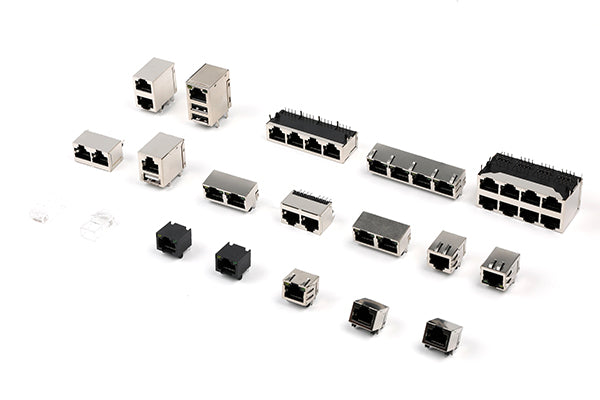Ethernet connector
Ethernet connector
The most common and recognizable Ethernet connector is the 8P8C modular connector, universally known as the RJ45 connector.
-
8P8C stands for 8 Position, 8 Contact. This means the plastic plug has 8 positions where gold-plated contacts (pins) can be placed.
-
RJ45 stands for Registered Jack 45. It's a standardized telecommunications network interface.
While technically "RJ45" refers to a specific wiring configuration for telephone systems, the term has become the universal name for the Ethernet plug.
Physical Description:
-
It's a clear plastic plug with a small, spring-loaded locking clip on the top.
-
Inside, you can see 8 colored wires, each ending in a thin gold pin.
-
The clip ensures a secure connection by snapping into a port and preventing it from being easily pulled out.
Types of RJ45 Connectors (by Application)
There are two main types of RJ45 connectors, differentiated by what they connect to:
1. Ethernet Plug (Male Connector)
This is the plug on the end of a network cable (patch cable). You insert it into a port on a computer, router, or switch.
2. Ethernet Jack (Female Connector)
This is the port you plug the cable into. It's found on devices like:
-
Computers (NICs)
-
Routers, Switches, and Hubs
-
Gaming Consoles
-
Smart TVs
-
Network Printers
-
Wall outlets (which lead to in-wall cabling)
Wiring Schemes: T568A vs. T568B
Inside the RJ45 connector, the eight wires must be arranged in a specific order. There are two standardized color codes defined by the TIA/EIA association:
-
T568B: This is by far the most common standard used in residential and commercial installations, especially in North America. It's often considered the default.
-
T568A: Historically used for telephone systems and sometimes seen in government or older installations.
The Key Rule: For a standard straight-through cable (used to connect different types of devices, like a computer to a router), both ends of the cable must use the same wiring scheme (B-B or A-A).
For a crossover cable (used to connect two like devices directly, like two computers, without a switch), one end must be T568A and the other T568B.
Other (Less Common) Ethernet Connectors
While RJ45 is the standard for copper twisted-pair cabling, other connectors are used for different Ethernet physical layers.
1. GG45 / ARJ45
A backward-compatible successor to RJ45 designed for higher Category cables (like Cat7/7A/8) to support 40 Gigabit Ethernet. It has additional contacts at the top and bottom.
2. TERA
A completely different, proprietary connector design by Siemon that also supports high-frequency performance for Cat7/7A systems. It is not compatible with RJ45.
3. Fiber Optic Connectors
Ethernet over fiber optic cables uses completely different connectors, as they transmit light instead of electrical signals. Common types include:
-
LC (Lucent Connector): Small, square, and very common for modern networking equipment and SFP modules.
-
SC (Subscriber Connector): A squarish connector with a push-pull design, common for older and some current gear.
-
ST (Straight Tip): An older round connector with a bayonet-style twist-lock, common in older installations.
Key Features to Know
-
Locking Clip: The plastic clip is crucial for a stable connection. A broken clip is the most common reason for a "bad cable," as it fails to keep the connector securely seated in the jack.
-
Modular Design: The RJ45 connector is designed to be crimped onto a cable. This is done with a specialized tool called a crimper.
-
Category (Cat) Rating: Connectors are rated for specific cable categories (e.g., Cat5e, Cat6, Cat6a). Using a lower-rated connector on a higher-rated cable (e.g., a Cat5e connector on a Cat6 cable) can degrade performance and prevent it from reaching its maximum speed.
Kan beschikbaarheid voor afhalen niet laden
Niet op voorraad
Alle details bekijken
